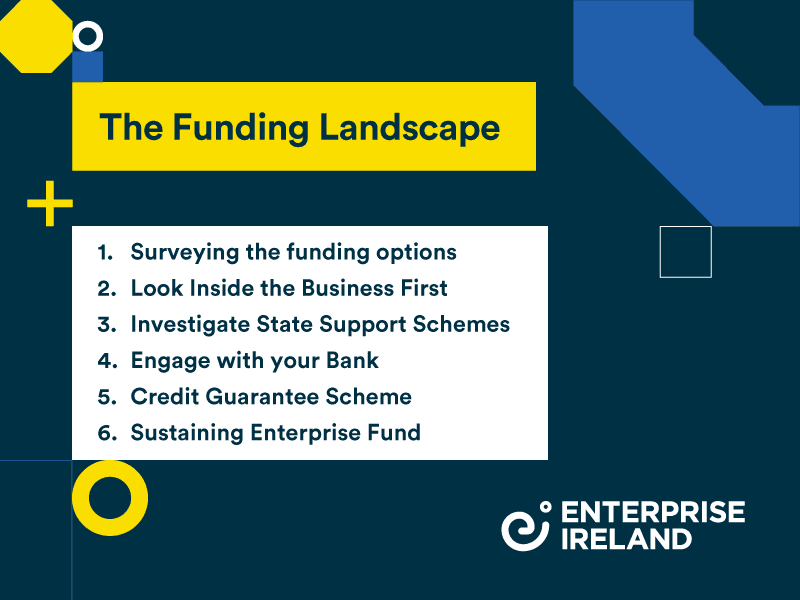With entire business sectors forced to either cease trading completely or go into a period of near hibernation as a result of the Covid-19 pandemic, many companies are faced with a situation where income has slowed to a trickle while outgoings cannot be eliminated entirely if the business is to survive and emerge from the crisis intact.
Look Inside the Business First
These factors make a company’s state of readiness for access to funding, from all sources, critically important. When surveying the funding landscape, John Power, director of specialist financial advisory firm SGL, says the best place for companies to start is internally. That potential source encompasses existing debtors and customers who may be willing to pay in advance for a discount and also maximising terms with creditors which may include payments to Revenue.
“Firms must still submit their returns on time, but Revenue is not going to apply penalties and interest for late payment,” says Power. “Revenue has really stepped up to the plate here. Companies should appreciate that flexibility and use it while they can.”
Investigate State Support Schemes
He also points to the range of supports on offer from the State, including the €450 million Covid-19 Working Capital Loan and €200 million Future Growth Loan schemes available through the Strategic Banking Corporation of Ireland (SBCI) and the €180 million Sustaining Enterprise Fund through Enterprise Ireland to help companies in the manufacturing and internationally traded services sectors to adapt their business models and return to viability. A Rescue and Restructuring Fund for worst-case scenarios is also available.
“The SBCI Working Capital Loan Scheme offers loans of between €25,000 and €1.5 million over three years with a maximum interest rate of 4%,” says Power. “The funding is available on an interest-only basis for the first three months, and that will help companies get through the initial period of the crisis. Also, the first €500,000 is unsecured. That’s very important for service-based companies who may have limited assets to use as security.”
Enterprise Ireland also has a new €5,000 Covid-19 Business Financial Planning Grant to help companies prepare financial plans for their internal needs and to better prepared to present a strong lending proposal to banks and the SBCI. There are also a number of strategic consultancy grants and other supports available to help companies maintain and enhance their competitiveness.
Smaller companies also have other options. “Microfinance Ireland has stepped up with loans of up to €50,000 over three to five years at an interest rate now reduced to 4.5%, with no repayments required and no interest charged in the first six months,” says Power.
Engage with your Bank
Bank finance is, of course, an option worth pursuing but can be difficult to get in the current environment. “Banks look principally at two things,” Power explains. “Capacity to repay and security. And they need both before they will advance a loan. I hope that banks take a forward-looking view or else look back on 2019 performance when assessing companies’ ability to repay loans. If they just look at the first quarter of 2020, it will make things very difficult.”
Credit Guarantee Scheme
Companies which can demonstrate capacity to repay, but fall down on security, can always utilise the Credit Guarantee Scheme, he adds. Managed through the SBCI, the scheme guarantees 80% of the value of the loan in return for a half a percent premium on the interest rate. “This gives the banks the security they require in many cases,” says Power.
Sustaining Enterprise Fund
For companies that have been unable to raise finance through either the SBCI or the banks there is the Enterprise Ireland Sustaining Enterprise Fund. The purpose of the €180 million fund is to sustain companies which have been impacted by a 15% or greater reduction in actual or projected turnover or profit, or which have seen significant increase in costs as a result of the Covid-19 outbreak.
In order to qualify, businesses must provide a Business Sustainment Plan outlining how the company will be stabilised and return to viability. Qualifying businesses will be offered a repayable advance of up to €800,000 to support the implementation of the plan.
Very importantly, there is a three-year grace period on repayments. The advance must be repaid by the end of year five.
“I am pleased to say that the new Sustaining Enterprise Fund is now open for businesses who are unable to raise adequate funding from the market,” says Enterprise Ireland CEO Julie Sinnamon. “My strong advice to companies is, if you haven’t already done so, to prepare an assessment of your financial requirements and progress funding applications to the banks and the Strategic Banking Corporation of Ireland (SBCI) immediately. Enterprise Ireland’s new Business Financial Planning grant will help companies to prepare a Business Sustainment Plan.”
Other supports available through Enterprise Ireland include the new €2 million Covid-19 Online Retail Scheme which offers grants of up to €40,000 to retailers employing over 10 people to develop a more competitive online offer. Companies can also avail of the new €2,500 LEAN Business Continuity Voucher to help them access the expertise to identify the key measures needed to ensure continued operations.



